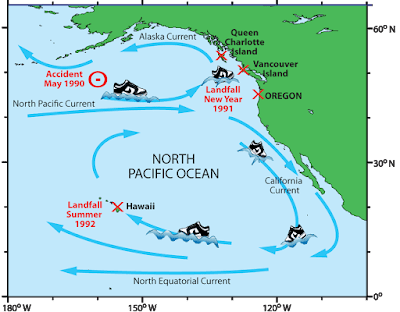In May, 1990 a storm off the coast of Alaska knocked containers off a ship that was on its way from Korea to the United States. Some of the containers broke open sending 61,000 Nike shoes on a journey through the North Pacific Ocean. The following winter hundreds of Nikes washed up on the shores of British Columbia, Washington and Oregon.
To oceanographers these shoes are "drifters," floating objects that enable them to test models of ocean currents. A model known as the Ocean Currents Simulator (OSCURS) predicted that most of these shoes would make landfall in British Columbia about 249 days after the accident. The first ones were found there 220 days after. Later shoes were found off the coast of Oregon showing that the currents diverted some of them to the south. A year and a half later some of them made landfall in Hawaii.
In early 1992, a similar accident sent a bunch of toy ducks into the ocean. Here is a map of "possible journeys" and places they were found over the next 11 years.
To reach the Atlantic Ocean they had to pass through the icy Arctic. They have lost their color, according to this article but many are still floating out there.
For more about ocean currents see these pages from the SEOS project.
To oceanographers these shoes are "drifters," floating objects that enable them to test models of ocean currents. A model known as the Ocean Currents Simulator (OSCURS) predicted that most of these shoes would make landfall in British Columbia about 249 days after the accident. The first ones were found there 220 days after. Later shoes were found off the coast of Oregon showing that the currents diverted some of them to the south. A year and a half later some of them made landfall in Hawaii.
In early 1992, a similar accident sent a bunch of toy ducks into the ocean. Here is a map of "possible journeys" and places they were found over the next 11 years.
To reach the Atlantic Ocean they had to pass through the icy Arctic. They have lost their color, according to this article but many are still floating out there.
For more about ocean currents see these pages from the SEOS project.




































